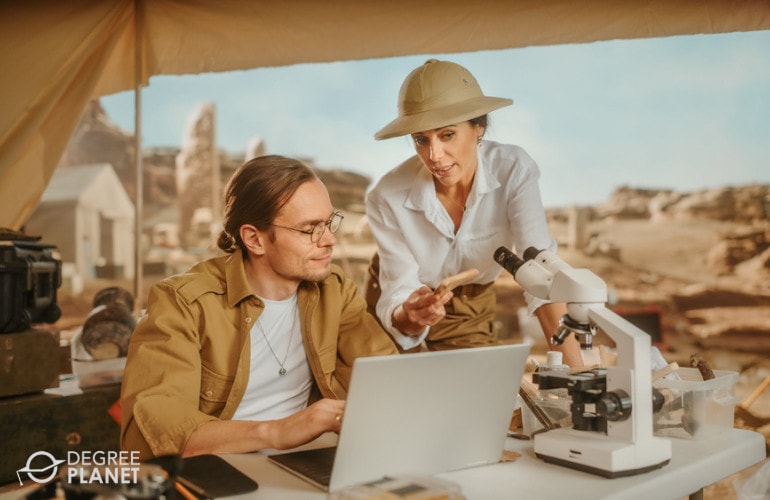Ph.D. in Anthropology: Introduction, Admission, Registration, Eligibility, Duration, Fees, Syllabus 2024

Introduction:
Embark on a journey of discovery and exploration with a Ph.D. in Anthropology. This advanced degree opens doors to a world of understanding human culture, behavior, and evolution. From delving into ancient civilizations through archaeology to unraveling contemporary social dynamics, anthropology offers a rich tapestry of knowledge. In this blog, we'll navigate through the admission process, eligibility criteria, completion time, career opportunities, syllabus, internship prospects, scholarships, and FAQs surrounding a Ph.D. in Anthropology.
Admission Process:
- Research Programs: Explore different universities offering Ph.D. programs in Anthropology. Look into faculty expertise, research opportunities, and program reputation.
- Application Submission: Prepare and submit your application including transcripts, letters of recommendation, statement of purpose, and any additional requirements specified by the institution.
- Entrance Exams: Some universities may require GRE scores for admission. Check the specific requirements of each program.
- Interview: Shortlisted candidates may be invited for an interview to discuss their research interests and goals.
- Acceptance: Once accepted, review the offer letter and any financial aid packages before confirming your enrollment.
Eligibility:
- Master's Degree: Typically, applicants should hold a master's degree in Anthropology or a related field.
- Academic Excellence: A strong academic record, especially in anthropology and related coursework, is essential.
- Research Experience: Previous research experience, publications, and presentations can strengthen your application.
- Letters of Recommendation: Obtain letters from academic referees who can speak to your academic abilities and research potential.
Completion Time:
The completion time for a Ph.D. in Anthropology varies depending on factors such as research area, program structure, and individual progress. On average, it may take between 4 to 6 years to complete the degree, including coursework, comprehensive exams, dissertation research, and writing.
Career Opportunities:
- Academia: Many Ph.D. graduates pursue careers as professors or researchers in universities and colleges, teaching and conducting research in anthropology departments.
- Research Institutions: Opportunities exist in research institutions, museums, and think tanks, where anthropologists contribute to interdisciplinary projects.
- Government Agencies: Government agencies at local, national, and international levels hire anthropologists for roles in policy development, cultural resource management, and international development.
- Non-Profit Organizations: NGOs and non-profit organizations employ anthropologists for roles in community development, cultural preservation, and advocacy.
- Private Sector: Anthropologists also find opportunities in the private sector, working in industries such as market research, user experience design, and corporate social responsibility.
Syllabus:
- Core Courses: Foundation courses covering key concepts and theories in anthropology, including cultural anthropology, archaeology, biological anthropology, and linguistic anthropology.
- Specialized Seminars: Advanced seminars focusing on specific subfields within anthropology, such as medical anthropology, environmental anthropology, or visual anthropology.
- Research Methods: Courses on qualitative and quantitative research methods, data analysis, and fieldwork techniques.
- Electives: Students have the opportunity to choose elective courses based on their research interests and career goals.
- Dissertation Research: Independent research under the guidance of a faculty advisor, culminating in a dissertation that contributes to the field of anthropology.
Internship Opportunities:
- Fieldwork: Many Ph.D. programs incorporate fieldwork opportunities where students can gain hands-on experience conducting anthropological research in diverse cultural settings.
- Museum Internships: Internships at museums and cultural institutions provide exposure to curation, exhibition design, and public engagement.
- Community Engagement: Collaborate with local communities on research projects, cultural preservation initiatives, or public outreach programs.
- Government Agencies: Internships with government agencies offer insight into the role of anthropologists in policy-making and cultural resource management.
Scholarships and Grants:
- Institutional Funding: Universities often offer scholarships, fellowships, and assistantships to support Ph.D. students in anthropology.
- External Grants: Explore funding opportunities from external sources such as research grants, fellowships, and scholarships offered by government agencies, foundations, and non-profit organizations.
- Fieldwork Grants: Specific grants may be available to support fieldwork expenses for dissertation research in anthropology.
- Conference Travel Grants: Funding to attend conferences and present research findings can be obtained from academic societies and professional associations in anthropology.
FAQs:
Can I pursue a Ph.D. in Anthropology without a master's degree?
While a master's degree is typically required for admission to Ph.D. programs, some universities may offer combined bachelor's-master's-Ph.D. programs for exceptional candidates.
What career options are available for Ph.D. graduates in Anthropology?
Ph.D. graduates in Anthropology can pursue careers in academia, research institutions, government agencies, non-profit organizations, and the private sector.
How important is fieldwork in anthropology Ph.D. programs?
Fieldwork is often a crucial component of anthropology Ph.D. programs, providing students with hands-on research experience and cultural immersion necessary for their dissertation research.
Are there opportunities for interdisciplinary research in anthropology Ph.D. programs?
Yes, many anthropology Ph.D. programs encourage interdisciplinary research, allowing students to collaborate with scholars from other disciplines and explore diverse research questions.
What financial support is available for Ph.D. students in anthropology?
Ph.D. students in anthropology may receive funding through scholarships, fellowships, assistantships, grants, and research stipends provided by universities, external agencies, and research sponsors.
